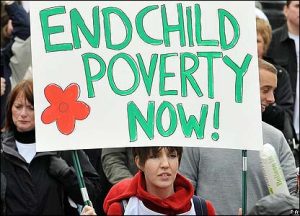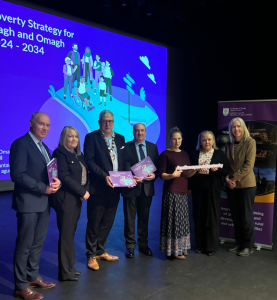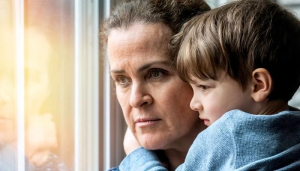“UK poverty levels break international law”
13 November 2023
By Becca Bor
A variety of reports have been published recently that highlight the dire levels of poverty in Northern Ireland and across the UK. As we move into the winter months, the predictable hardships only become more acute. High energy costs during the cold winter months will leave people freezing in their homes – choosing between eating and heating.
The Department for Communities reported earlier this month that 68,000 children across Northern Ireland are living in absolute poverty. A number only compounded by the two-child limit, which limits the child payment of Universal Credit to the first two children in the household. Additionally, low wages, an inadequate benefit system, high private rents, and cuts to programmes such as the ‘school holiday food grant’ have created a particularly precarious situation for many children across the North.
The Joseph Rowntree Foundation published a report at the end of October regarding the levels of destitution in the UK. In fact, the situation is so bleak that Olivier De Schutter, the UN’s special rapporteur on extreme poverty and human rights, said that the UK is breaking international law, since the government has permitted such immiseration of its population.
The Joseph Rowntree report highlighted that approximately 3.8 million people across the UK experienced destitution in 2022, including around one million children. This is an increase of 61% since the last Destitution in the UK survey in 2019, and an increase of 148% compared to 2017. The number of children experiencing destitution since 2017 has almost tripled with an increase of 186%.
Within these shocking statistics, there are groups of people disproportionately impacted by poverty. This includes non-UK/Irish nationals, particularly those who do not have recourse to public funds; people with disabilities and long-term chronic health conditions; and those with children.
Across the UK, black-led households were three times as likely to experience destitution. 62% of those experiencing destitution also reported having a chronic health problem or disability. Additionally, destitution is experienced by a growing number of families with children, particularly those in lone-parent households.
Closer to home, the Trussell Trust NI also published figures last week on their foodbanks across Northern Ireland.
“Food banks have seen the highest levels of need ever – More than 39,000 emergency food parcels were provided across Northern Ireland between 1 April 2023 and 30 September 2023 – this is a 23% increase from the same period last year.
Families with children continue to be most likely to need support from food banks – 3,600 families with children, and a total of 8,400 children, were supported across Northern Ireland between 1 April 2023 and 30 September 2023 – an 11% increase from 2022 and 50% increase since 2021. 73% of all parcels provided by Trussell Trust food banks across Northern Ireland in the last 6 months were for families with children.
More families have needed to turn to a food bank for the first time – Over the last 6 months, nearly 10,000 people across Northern Ireland have needed to turn to a food bank for the first time. This represents a 10% increase from the same period last year.”
“Emergency food parcel distribution in Northern Ireland, April– September 2023” The Trussell Trust, Northern Ireland
For a country as wealthy as the UK, this is criminal – and, contra-international law. The idea that “a rising tide lifts all ships” or that wealth will “trickle down” is clearly wrong-headed. Targeted interventions are necessary to ensure that the poorest in our society are lifted out of poverty. Primarily this needs to be accomplished by ensuring that incomes into households remain higher than out-goings.
The recommendations from Joseph Rowntree are similar to those of the UN Special Envoy, the Trussell Trust, Cliff Edge Coalition, and others.
Whilst not an exhaustive list, NIAPN supports the following basic demands that will help the most vulnerable people in our society.
- An ‘Essentials Guarantee’ to ensure that Universal Credit’s basic rate covers the costs of essentials. Deductions and sanctions should not be allowed to reduce support below this rate.
- Address debt by mitigating against the 5-week wait for new UC claimants – a particular worry as those on legacy benefits are beginning to migrate to UC.
- Provide cash-first support for people struggling to make ends meet.
- Uprate the Local Housing Allowance in line with rents.
- End the two-child limit for Universal Credit.
- Reinstate and fully fund the School Holiday Food Grant, Discretionary Housing Payments, Discretionary Support.






